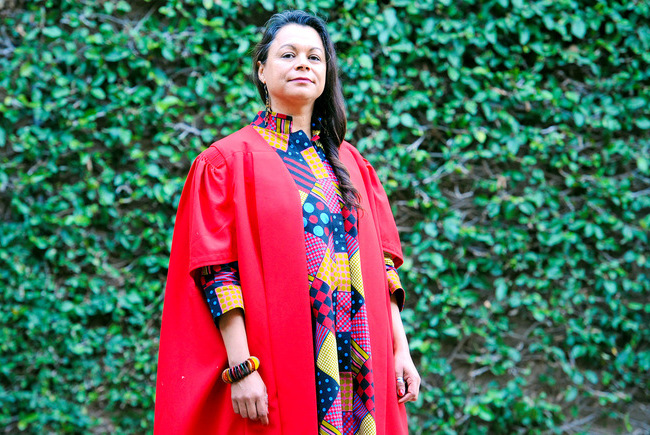Something old, something new, something borrowed, something blue
26 September 2024 | Story Lyndon Julius. Photos Lerato Maduna. Read time 7 min.
On a memorable evening at the University of Cape Town (UCT), Professor Gregory Smith delivered his inaugural lecture titled “The Marriage of Organometallic Chemistry: Something Old, Something New, Something Borrowed, Something Blue”, in the presence of his family, peers, former and current students, and colleagues. The lecture highlighted the depth of Professor Smith’s contributions to the field of organometallic chemistry.
UCT’s vice-chancellor, Professor Mosa Moshabela, opened the evening by reflecting on the significance of inaugural lectures: “Inaugural lectures mark the ascent to full professorship, the highest academic rank. It provides universities with an opportunity to celebrate the achievements of the academics. They also, importantly, provide an opportunity for the inaugural lecturer to share his or her insights into their scholarly work in a manner that is accessible to us, the broader audience.”
Smith’s lecture unfolded through the lens of a wedding metaphor, with the title referencing the classic wedding rhyme: “Something old, something new, something borrowed, something blue and a sixpence in your shoe.”
He used this structure to explore the evolution and future of organometallic chemistry, touching on key milestones in the field and how it continues to borrow from nature, with a particular emphasis on sustainability.
Something old: The foundations of organometallic chemistry
Smith got his lecture underway by addressing the “old” components of organometallic chemistry, highlighting foundational reactions that have defined the field for decades. He paid special attention to hydroformylation, a process discovered in the 1930s, that remains crucial to industrial chemistry today.
“Hydroformylation is a cornerstone of organometallic chemistry,” Smith said. “It showcases how fundamental research can still be relevant decades later, particularly in industrial applications.”
Something new: Pioneering biopolymer-supported catalysts
In discussing the “new” aspects of his work, Smith shifted to one of his key research areas: biopolymer-supported rhodium catalysts. These catalysts offer a more sustainable approach to chemical reactions by being biodegradable and non-toxic, fitting squarely into the realm of green chemistry.
“The new frontier in catalysis is sustainability,” he continued. “We must find ways to make our processes not only efficient but also environmentally responsible. The future of chemistry lies in developing methods that reduce waste and minimise harm to the environment.”
Something borrowed: Mimicking nature with dendrimers
Smith introduced the concept of dendrimers, highly branched macromolecules that take inspiration from biological systems. “Dendrimers are like nature’s own design,” he noted. “These molecules have a highly organised structure, and their applications range from drug delivery to materials science.”
His research has borrowed principles from nature to create dendrimers that can perform highly specific functions in various chemical processes. “The beauty of dendrimers,” Smith said, “is that they can be tailored for a wide range of uses, making them one of the most versatile tools in modern chemistry.”
Something blue: The future of bio-organometallic chemistry
The “blue” component of Smith’s lecture focused on bio-organometallic chemistry, particularly his groundbreaking work on ruthenium-arene complexes for cancer treatment. These complexes have shown remarkable efficacy in targeting drug-resistant ovarian cancer cells, offering new hope for patients facing limited treatment options.
“Our ruthenium-based compounds are exciting because they offer an innovative way to target cancers that have become resistant to conventional therapies,” Smith explained. “The future of chemotherapy could lie in these metal-based drugs.”
Recapping the rhyme:
- Something old: Focusing on time-honoured reactions like hydroformylation, a process that converts olefins into aldehydes using carbon monoxide and hydrogen.
- Something new: His research into biopolymer-supported catalysts – environmentally friendly, biodegradable catalysts – was highlighted as a novel development.
- Something borrowed: Borrowing from nature’s designs, Smith’s exploration of dendrimers – highly branched, tree-like molecules – underscored the potential of these molecules to mimic natural systems for use in catalysis and drug delivery.
- Something blue: His work in bio-organometallic chemistry, particularly in developing ruthenium-arene complexes for cancer treatment, was a key focus.
The director of the Centre for Supramolecular Chemistry Research, Professor Susan Bourne, delivered the vote of thanks and praised Smith’s ability to blend deep scientific inquiry with real-world relevance.
 This work is licensed under a Creative Commons Attribution-NoDerivatives 4.0 International License.
This work is licensed under a Creative Commons Attribution-NoDerivatives 4.0 International License.
Please view the republishing articles page for more information.
The UCT Inaugural Lecture Series
Inaugural lectures are a central part of university academic life. These events are held to commemorate the inaugural lecturer’s appointment to full professorship. They provide a platform for the academic to present the body of research that they have been focusing on during their career, while also giving UCT the opportunity to showcase its academics and share its research with members of the wider university community and the general public in an accessible way.
In April 2023, Interim Vice-Chancellor Emeritus Professor Daya Reddy announced that the Vice-Chancellor’s Inaugural Lecture Series would be held in abeyance in the coming months, to accommodate a resumption of inaugural lectures under a reconfigured UCT Inaugural Lecture Series – where the UCT extended executive has resolved that for the foreseeable future, all inaugural lectures will be resumed at faculty level.
Recent executive communications
2025
2024

Professor Susan Cleary delivered her inaugural lecture on 14 March.
14 Mar 2024 - 5 min read2023

Prof Lydia Cairncross’s inaugural lecture provided a snapshot of the career path of a surgeon and community activist whose commitment to social justice means her work doesn’t end in the operating theatre.
02 Nov 2023 - 8 min read2022

Professor Linda Ronnie is in UCT’s Faculty of Commerce.
28 Sep 2022 - 6 min read2021
2020
2019
2018
2017
2016 and 2015
No inaugural lectures took place during 2015 and 2016.































































.jpg)


















